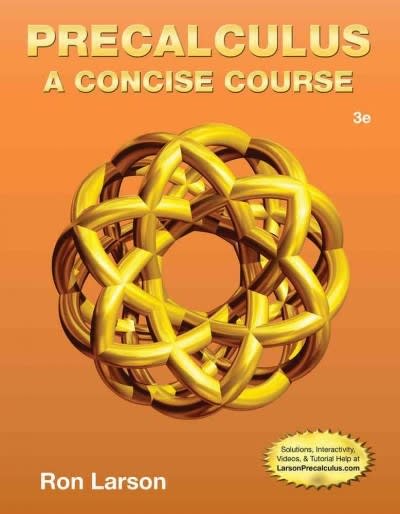Question
1.What's Wrong? In an American Optometric Association survey, 1009 adults were randomly selected and asked to identify what they worry most about losing. 51% of
1.What's Wrong? In an American Optometric Association survey, 1009 adults were randomly
selected and asked to identify what they worry most about losing. 51% of the respondents chose
"vision." What's wrong here?
2. Paying for First Dates USA Today posted this question on the electronic version of its
newspaper: "Should guys pay for the first date?" Of the 1148 subjects who decided to respond,
85% of them said "yes."
a. What is wrong with this survey?
b. Is the value of 85% a statistic or a parameter?
c. Does the survey constitute an experiment or an observational study?
3. Sample Design Literacy In "Cardiovascular Effects of Intravenous Triiodothyronine in
Patients Undergoing Coronary Artery Bypass Graft Surgery" [Journal of the American Medical
Association (JAMA), Vol. 275, No. 9], the authors explain that patients were assigned to one of
three groups: (1) a group treated with triidothyronine, (2) a group treated with normal saline
bolus and dopamine, and (3) a placebo group given normal saline. The authors summarize the
sample design as "randomized and double-blind." Describe the meaning of "randomized" and
"double-blind" in the context of this study.
4. Divorces and Margarine One study showed that there is a very high correlation between
the divorce rate in Maine and per capita consumption of margarine in the United States. Can we
conclude that either one of those two variables is the cause of the other?
5. Simple Random Sample Which of the following is>are simple random samples?
a. As Lipitor pills are being manufactured, a quality control plan is to select every 500th pill
and test it to confirm that it contains 80 mg of atorvastatin.
b. To test for a gender difference in the way that men and women make online purchases,
Gallup surveys 500 randomly selected men and 500 randomly selected women.
c. A list of all 10,877 adults in Trinity County, California, is obtained; the list is numbered from
1 to 10,877; and then a computer is used to randomly generate 250 different numbers between
1 and 10,877. The sample consists of the adults corresponding to the selected numbers.
6. Defense of Marriage Act Both of the following questions are essentially the same. Does
the difference in wording seem as though it could affect the way that people respond?
Are you in favor of the "Defense of Marriage Act"?
Are you in favor of an act that for federal and state aid, only heterosexual marriages should
be recognized?
7. Colleges in United States Currently, there are 4612 colleges in the United States, and the
number of full-time students is 13,203,477.
a. Are the numbers of full-time students at different colleges discrete or continuous?
b. What is the level of measurement for the numbers of full-time students at colleges?
(nominal, ordinal, interval, ratio)
c. What is wrong with surveying college students by mailing questionnaires to 10,000 of them
who are randomly selected?
d. If we randomly select 50 full-time college students in each of the 50 states, what type of
sample is obtained? (random, systematic, convenience, stratified, cluster)
e. If we randomly select four colleges and survey all of their full-time students, what type of
sample is obtained? (random, systematic, convenience, stratified, cluster)
8. Percentages
a. The labels on U-Turn protein energy bars include the statement that these bars contain
"125% less fat than the leading chocolate candy brands" (based on data from Consumer Reports
magazine). What is wrong with that claim?
b. In a Pew Research Center poll on driving, 58% of the 1182 respondents said that they like to
drive. What is the actual number of respondents who said that they like to drive?
c. In a Pew Research Center poll on driving, 331 of the 1182 respondents said that driving is a
chore. What percentage of respondents said that driving is a chore?
9. Types of Data In each of the following, identify the level of measurement of the sample
data (nominal, ordinal, interval, ratio) and the type of sampling used to obtain the data (random,
systematic, convenience, stratified, cluster).
a. At Albany Medical Center, every 10th newborn baby is selected and the body temperature is
measured (degrees Fahrenheit).
CHAPTER 1 Cumulative Review Exercises 37
b. In each of the 50 states, 50 voters are randomly selected and their political party affiliations
are identified.
c. A pollster stops each person passing her office door and asks the person to rate the last
movie that he or she saw (on a scale of 1 star to 4 stars).
10. Statistical Significance and Practical Significance The Technogene Research Group
has developed a procedure designed to increase the likelihood that a baby will be born a girl.
In a clinical trial of their procedure, 236 girls were born to 450 different couples. If the method
has no effect, there is about a 15% chance that such extreme results would occur. Does the
procedure appear to have statistical significance? Does the procedure appear to have practical significance?
Step by Step Solution
There are 3 Steps involved in it
Step: 1

Get Instant Access to Expert-Tailored Solutions
See step-by-step solutions with expert insights and AI powered tools for academic success
Step: 2

Step: 3

Ace Your Homework with AI
Get the answers you need in no time with our AI-driven, step-by-step assistance
Get Started


